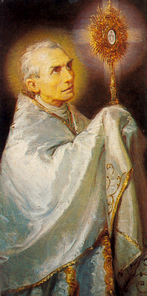Lives of the Saints
Our Models and Protectors
Spiritual Bouquet:
August 3

Saint Peter Julian Eymard
Founder
(1811-1868)
Saint Peter Julian Eymard was born in the Alpine mountains of eastern France in the year 1811, son of a poor olive-presser. His mother inspired in him horror of sin and love for the Blessed Sacrament and the Blessed Virgin. He solemnly promised Our Lord, on the day of his First Communion, that he would become a priest. This plan was not approved by his father, as Peter was his only son and destined to inherit his little industry. The young boy studied Latin on his own, in spare moments, encouraged by an Oblate missionary priest.
After the death of his father he entered the Oblate novitiate at Marseille and received the habit in 1829. It was not long, however, before he was sent home for poor health. Reduced to agony and having received the Last Sacraments, he was cured after praying to have the grace to say only one Mass before he died. Monsignor de Mazenod, bishop of Marseille and founder of the Oblates, helped him to enter the diocesan seminary, and there he was ordained in 1834. He was named to a country parish, backward at his arrival but fervent like himself at his departure five years later. His health had improved, and he felt a very strong call to enter the Marist Society of Lyons, recently founded.
The Founder and Superior General, Venerable Father Colin, soon perceived his great merits and named him successively to three important posts in the administration of the new Society of missionaries. It was as spiritual Director of the college of Belley that he became an experienced master in the direction of souls, both religious and lay. The families of the students, in addition to the professors and students themselves, found their piety flourishing miraculously, and almost unawares, under his gentle influence.
But God wanted yet more of this heroic priest, and Saint Peter Julian again recognized a divine call to go farther on the path of sacrifice. Certain that he must found a Congregation dedicated uniquely to promoting the glory and reign of Jesus in His Sacrament of Love, he met strong resistance in his Superior, who desired to keep him among the Marists. He loved that Community as he was loved by them, but eventually the Will of God became evident to all concerned. He was free to depart and to found with one associate, a priest who was a former military man, his new Society in Paris. He had already made his decisive retreat there under the authority of the archbishop, Msgr. Sibour, who had encouraged him, as had also Pope Pius IX on hearing of his intention.
The little Congregation, which grew slowly but surely, was obliged twice to abandon its first two headquarters, but not before they had done a remarkable work in Paris to prepare adults for First Communion. How many there were in those days of tottering faith, who had never made that Communion, the Lord knew well. This proposed labor had been the decisive factor for the Archbishop, when the retreatant, determined to obey him, confronted him with the question: Is it or not the Will of God for me to leave the Marist Fathers? It was in an old and miserable quarter of Paris that this labor for the poor began and continued, after 1857, for a short eleven years before its Founder's early death in 1868. During these years of constant opposition, demolitions, shock and unrelenting trials, Saint Peter Julian was exhausted by the difficulties of founding not one, but two Communities — a second one for Sister-Servants of the Blessed Sacrament, as well as an Association of Priest-adorers. He was destined to be the fertilizer at the base of the tree, as he had said; his prophetic word was fulfilled. After his death all his works expanded prodigiously; and less than one hundred years later, its heroic Founder was canonized by Pope John XXIII in 1962.
Reflection: Saint Peter Julian said one day to his priests: I have shown you the purpose and organization of our little Society: As for the means of success, that is not our affair, it is God's! God who gives success also grants failure to His chosen souls. As Saint Peter understood, crosses are His gifts of predilection. No one may enter heaven who has not been humiliated and formed to the likeness of the Eternal Son of God.
L'Apôtre de l'Eucharistie, Saint Pierre Julien Eymard, by Joseph Astruc, S.S.S. (Maison généralice des Pères du T. S. Sacrement: Rome, 1962).